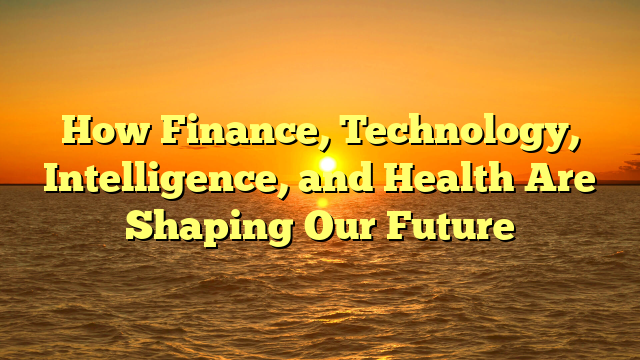Introduction: In the modern world, monetary systems, digital advancements, cognitive abilities , and health have become crucial pillars in shaping the way we live, work, and interact. These four fields are deeply interconnected, with developments in one area often driving progress in the others. This article explores how finance, technology, intelligence, and health are evolving and what the future holds for these key areas.
Finance: The Evolution of Money and Investment
The world of finance has been rapidly changing, driven by technological advancements, new economic theories, and globalization. One of the most significant changes in finance is the rise of decentralized finance (DeFi). Cryptocurrencies like Bitcoin and Ethereum have made headlines for their volatile nature but also their potential to revolutionize the way we view money and financial transactions.
Blockchain technology, the backbone of cryptocurrencies, has the potential to disrupt not only the financial sector but also supply chains, healthcare, and even government systems. In the realm of investment, machine learning are allowing investors to make smarter decisions with better predictions, minimizing risk and maximizing profits.
Moreover, seven77 are reshaping how individuals manage their wealth. With the rise of AI, traditional banking is being disrupted, and consumers now have access to automated financial tools.
Technology: The Engine of Innovation
Technology has made rapid advancements in the past few decades, and it is poised to continue revolutionizing every industry. The tech world is evolving faster than ever, with breakthroughs like AI, automation, and blockchain paving the way for a new era of innovation. one thing is clear: technology is driving all other industries forward, opening new opportunities and challenges alike.
One of the most exciting fields within technology is machine learning and AI are among the most promising technologies today. The integration of AI into daily life has the potential to dramatically improve productivity and efficiency in numerous sectors. For example, in healthcare, AI is being used to predict patient outcomes, assist with diagnostics, and even create personalized treatment plans.
Robotics has made tremendous progress, and its applications are expanding in areas like healthcare, manufacturing, and even space exploration. These technologies are automating tasks that were once done by humans, leading to increased productivity and reducing costs. However, the rise of automation has also raised concerns about job displacement and the future of the workforce.
Intelligence: The Role of AI and Human Cognitive Abilities
The relationship between human intelligence and artificial intelligence is becoming more intertwined. In some fields, AI has outpaced human intelligence, particularly in tasks that involve data processing and pattern recognition. However, AI still lacks the ability to replicate true human cognition, creativity, and emotional intelligence.
The field of brain-computer interfaces is striving to understand how the human brain works and how this knowledge can be used to enhance both human and machine intelligence. BCIs could transform healthcare by offering new treatment methods for conditions such as paralysis and neurological disorders.
Human cognitive abilities are unique in that they are influenced by emotions, experiences, and social interactions, qualities that AI does not yet possess.
Health: The Intersection of Medicine and Technology
The healthcare sector is undergoing a major transformation, driven by both technological advancements and a deeper understanding of human biology. Innovations in medicine, from gene editing to AI diagnostics, are changing the way we approach health and wellness.
One of the most significant advancements in health is the use of artificial intelligence in diagnostics. By analyzing vast amounts of medical data, AI algorithms can identify patterns that humans may miss, helping doctors make more accurate diagnoses.
Another breakthrough in healthcare is Telemedicine is revolutionizing healthcare by making it more accessible, particularly in rural and underserved areas. This technology has proven to be essential during global health crises like the COVID-19 pandemic, where social distancing measures made in-person visits difficult.
Precision medicine is another exciting development in the medical field. By using genetic information, doctors can tailor treatments to individual patients, improving effectiveness and reducing side effects. Precision medicine is revolutionizing the treatment of diseases like cancer, where therapies are becoming more targeted and individualized.
Conclusion:
The intersection of finance, technology, intelligence, and health is creating a new world where possibilities are endless. As we move into the future, these areas will continue to evolve, reshaping how we live and interact. Embracing technological innovations, investing in education and research, and focusing on human well-being will ensure that these advancements benefit society as a whole.
How Finance, Technology, Intelligence, and Health Are Shaping Our Future


